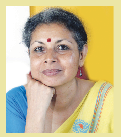- Home
- Archive -Jan 2021
- Sprit

Sprit
- In :
- Jan 2021-Sprit
Understand to Forgive
Wrong actions emerge from ignorance, and, therefore, we must learn to put them behind us and not make them an entrenched part of our identity, says Suma Varughese
I have been an avid listener of the spiritual teacher and author Eckhart Tolle’s YouTube videos during the lockdown, and they have helped me enormously. (I would highly recommend them since I consider him to be one of the foremost teachers of Jnana Yoga that we have on the planet presently.)
A recent one touched a chord with me. In an interview with a well-known American talk-show host, Dave Rubin, who runs a YouTube show called the Rubin Report, Eckhart talked about the need to go beyond guilt for the things we may have done wrong. Now, I have a tendency to flay myself for saying something that hurt someone or for eating the wrong food which upset my stomach. Not only would I berate myself for wrong doing in the present moment but also for anything I may have done in the past, which memory safely preserved and periodically tortured me with.
Eckhart’s logic goes thus: It is our lack of awareness that causes us to say or do the wrong thing. None of us is capable of acting better than our awareness permits us to. Therefore, it is (what the Buddha compassionately calls) ignorance that causes the wrong action and not ourselves. Of course, we still have to undergo the consequences of our action because karma is an absolute. But that is no reason for us to kick ourselves or others repeatedly for it.
Moreover, Eckhart points out, each time we do something wrong, we make it a part of our ego identity when, in fact, it is not who we are. He grew up with a father whose awareness was limited, and it often caused him to burst into explosions of rage. The young Eckhart grew up with a sense of constant anxiety as to when the next explosion would occur. This led him to nurse a grudge against his father during his early 20s. It was his spiritual awakening that enabled him to recognise that his father was incapable of acting any way other than the way he did, and that freed him of his resentment. He quotes Jesus Christ’s last words while on the Cross, “Father, forgive them for they know not what they do.”
This recognition of the ignorance that drives our behaviour is true forgiveness, says Eckhart. Our anger is washed clean by the knowledge that the other’s act was not a personal outrage against us. It emerged from their inability to control themselves or contain their reaction. A French proverb rightly says, “To understand everything is to forgive everything.”
I cannot help thinking this perspective will help us in forgiving both ourselves and others. Many of us give ourselves a hard time when we do wrong because we think we will otherwise not repent. However, the more we beat ourselves up, the more entrenched as a part of our identity it becomes and the more often we repeat the mistake. And memories of our transgressions will only grow more powerful. We must learn to experience our feelings and thoughts about our actions, forgive ourselves for them, and put them behind us. And as Eckhart did for his father, it may help us be more compassionate towards others too.
Of course, I acknowledge that, unlike Eckhart, most of us are not enlightened. But forgiveness is hard work. Factoring in this perspective may help us get there faster.
To read more such articles on personal growth, inspirations and positivity, subscribe to our digital magazine at subscribe here
Life Positive follows a stringent review publishing mechanism. Every review received undergoes -
- 1. A mobile number and email ID verification check
- 2. Analysis by our seeker happiness team to double check for authenticity
- 3. Cross-checking, if required, by speaking to the seeker posting the review
Only after we're satisfied about the authenticity of a review is it allowed to go live on our website
Our award winning customer care team is available from 9 a.m to 9 p.m everyday
The Life Positive seal of trust implies:-
-
Standards guarantee:
All our healers and therapists undergo training and/or certification from authorized bodies before becoming professionals. They have a minimum professional experience of one year
-
Genuineness guarantee:
All our healers and therapists are genuinely passionate about doing service. They do their very best to help seekers (patients) live better lives.
-
Payment security:
All payments made to our healers are secure up to the point wherein if any session is paid for, it will be honoured dutifully and delivered promptly
-
Anonymity guarantee:
Every seekers (patients) details will always remain 100% confidential and will never be disclosed
